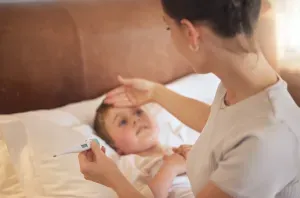Does My Child Have ADHD?
Attention Deficit/Hyperactivity Disorder (ADHD) has many symptoms and not all are that easy to spot at first. It is a complex disorder that is usually diagnosed before teen years and on average by age 7. When a parent asks the question, does my child have ADHD, it’s time to find out.
Where To Start
Turn to Pediatric Associates first for an evaluation. We may ask you and your child’s teachers to fill out a questionnaire. We may refer your child to another specialist, like a psychologist or psychiatrist, but our office is a good place to begin. We will complete an evaluation and be able to give you some consensus and direction.
All providers follow certain guidelines for diagnosing ADHD in children and adults so there is a diagnostic standard.
Common Behaviors Indicating ADHD In A Child
There are TWO basic attributes displayed by a child with ADHD–inattentiveness and hyperactivity/impulsivity. What follows from those are the symptoms and behaviors associated with the attribute. Let’s take them one at a time.
Being Inattentive
This trait can include procrastination, inability to complete tasks like homework and chores, and moving from one activity to another without completion. They may exhibit lack of focus, be disorganized, and have a hard time paying attention to detail.
Some other behaviors can include the following:
- Not listening
- Not following social rules
- Forgetting daily activities
- Being easily distracted even by trivial noises
- Messy careless work with mistakes
- Tendency to daydream
Being Hyperactive/Impulsive
Toddlers and preschoolers with ADHD tend to always be in motion. They jump and run, and it is difficult for them to participate in any group activities that requires them to sit still. A child with ADHD will squirm, fidget and talk a lot.
Other behaviors include:
- Getting up frequently to walk or run
- Difficulty playing quietly
- Excessive talking
- Always moving
- Frequent interruptions
- Talking at inappropriate times
- Unable to wait their turn
- Giving answers even before the question is completed
These children will often not recognize the needs of others so they will interrupt.
A child may be inattentive only (formerly called “ADD”) or hyperactive/impulsive only (formerly called “hyperactivity), but the most common form of ADHD is a combination of inattentiveness and hyperactivity/impulsivity.
Some Final Thoughts
All children exhibit some of these behaviors as they grow. A child with true ADHD will most likely struggle with self-esteem, might have some troubled relationships, and suffer with poor school performance. The question is, are these behaviors causing impairment at school and in other social situations?
A child with ADHD may never outgrow the symptoms, but they can learn strategies to become successful, and may not need any treatment as adults. Early diagnosis and treatment can improve outcomes.
Contact Pediatric Associates if you have concerns your child may have ADHD.
The post Does My Child Have ADHD? appeared first on Pediatric Associates, Inc..







